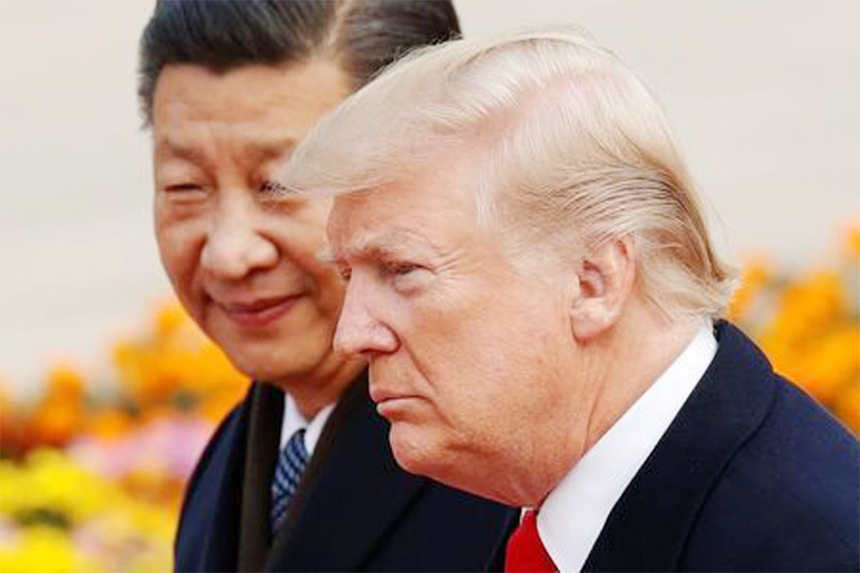
Reuters, Beijing :
US President Donald Trump’s cancellation of a summit with North Korean leader Kim Jong Un threatens further strain on U.S.-China ties amid a trade dispute that had been intertwined with Beijing’s pressure on isolated Pyongyang.
The United States and China are also increasingly at odds in the disputed South China Sea. The Pentagon this week withdrew an invitation for China to take part in a major naval exercise in Hawaii, and Beijing has ramped up pressure on self-ruled Taiwan, armed by Washington but claimed by Beijing.
Trump on Thursday released a letter to Kim announcing his withdrawal from the planned June 12 meeting in Singapore, which would have been the first between leaders of the two countries.
Although Chinese state media called for continued engagement between Washington and Pyongyang, Trump’s move could mark a split between China and the United States over how to deal with North Korea and its nuclear weapons, experts said.
It also risks adding fuel to simmering trade tensions, just days after China and the United States pulled back from the brink of a full-blown trade war.
“Definitely there are people in the U.S. who want to use this as an excuse for their efforts to push the relationship in the direction of confrontation,” said Jia Qingguo, dean of the School of International Studies at China’s Peking University, referring to the collapse of the Trump-Kim summit.
“This is one of the lowest points in the relationship since the normalization of relations between the two countries,” he added.
China’s foreign ministry on Friday said the government would keep encouraging the United States and North Korea to have direct talks, describing such communication as having a “pivotal” role in denuclearisation.
“Rest assured, China will continue, in our own way, to carry out U.S.-North Korea work, so as to promote the resumption of the dialogue process on the peninsula,” ministry spokesman Lu Kang told reporters.
China has long viewed North Korea as a useful buffer between it and U.S. forces in South Korea. The two also have deep emotional ties; Chinese troops fought side-by-side with North Korea in the 1950-53 Korean War.
But in recent years, relations between China and North Korea had nosedived to the point of a near diplomatic freeze, as Beijing signed on to ever-stricter United Nations sanctions over Pyongyang’s nuclear and ballistic missile programs.
China’s willingness to keep up pressure on its neighbor may now wane.
Even with the summit’s collapse, China must continue to improve ties with North Korea given Kim’s pledge not to carry out nuclear and missile tests, China’s widely read state-run Global Times tabloid said in an editorial on Friday.
US President Donald Trump’s cancellation of a summit with North Korean leader Kim Jong Un threatens further strain on U.S.-China ties amid a trade dispute that had been intertwined with Beijing’s pressure on isolated Pyongyang.
The United States and China are also increasingly at odds in the disputed South China Sea. The Pentagon this week withdrew an invitation for China to take part in a major naval exercise in Hawaii, and Beijing has ramped up pressure on self-ruled Taiwan, armed by Washington but claimed by Beijing.
Trump on Thursday released a letter to Kim announcing his withdrawal from the planned June 12 meeting in Singapore, which would have been the first between leaders of the two countries.
Although Chinese state media called for continued engagement between Washington and Pyongyang, Trump’s move could mark a split between China and the United States over how to deal with North Korea and its nuclear weapons, experts said.
It also risks adding fuel to simmering trade tensions, just days after China and the United States pulled back from the brink of a full-blown trade war.
“Definitely there are people in the U.S. who want to use this as an excuse for their efforts to push the relationship in the direction of confrontation,” said Jia Qingguo, dean of the School of International Studies at China’s Peking University, referring to the collapse of the Trump-Kim summit.
“This is one of the lowest points in the relationship since the normalization of relations between the two countries,” he added.
China’s foreign ministry on Friday said the government would keep encouraging the United States and North Korea to have direct talks, describing such communication as having a “pivotal” role in denuclearisation.
“Rest assured, China will continue, in our own way, to carry out U.S.-North Korea work, so as to promote the resumption of the dialogue process on the peninsula,” ministry spokesman Lu Kang told reporters.
China has long viewed North Korea as a useful buffer between it and U.S. forces in South Korea. The two also have deep emotional ties; Chinese troops fought side-by-side with North Korea in the 1950-53 Korean War.
But in recent years, relations between China and North Korea had nosedived to the point of a near diplomatic freeze, as Beijing signed on to ever-stricter United Nations sanctions over Pyongyang’s nuclear and ballistic missile programs.
China’s willingness to keep up pressure on its neighbor may now wane.
Even with the summit’s collapse, China must continue to improve ties with North Korea given Kim’s pledge not to carry out nuclear and missile tests, China’s widely read state-run Global Times tabloid said in an editorial on Friday.

